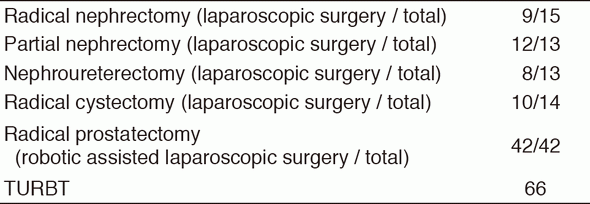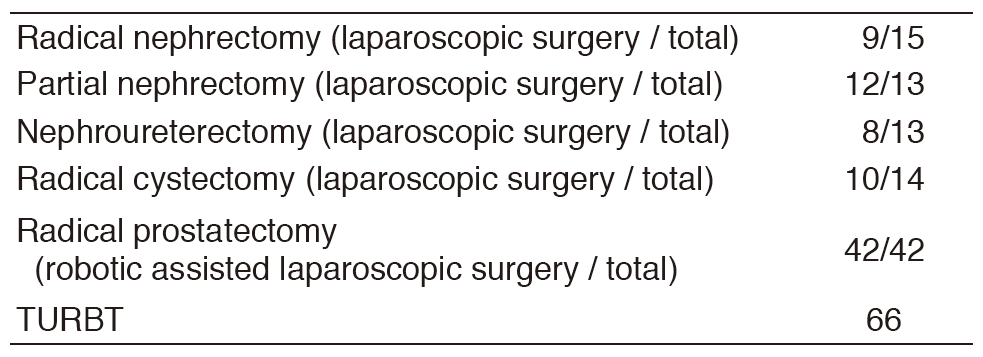HOME > Publication & Reports > Annual Report 2016 > Hospital East
Department of Urology
Yasuyuki Sakai, Yoshinobu Komai
Introduction
The Department of Urology has existed as part of the Medical Group of Pelvic Surgery at theNational Cancer Center Hospital East since 2003. Our department mainly treats diseases of the pelvic organs, including urogenital cancer, with the aim of preserving the sexual and/or voiding functions under minimally invasive surgery.
Our team and what we do
1.Outpatient activities
The outpatient clinic is open three days a week as the Department of Urology . Flexible cystoscopy, abdominal ultrasonography, retrograde pyelography, and prostate biopsy are performed in the outpatient clinic. Superficial bladder cancer (G3, cis, or recurrent tumor) after TUR-Bt is treated by the instillation of BCG into the bladder. Advanced urogenital cancers including metastatic prostate cancer are referred to the medical oncology division for chemotherapy or hormonal therapy. Extrinsic obstructions of the upper urinary tract that directly result from invasion of an adjacent malignancy or peritoneal metastasis are also treated. In most cases, internal stenting is better tolerated than percutaneous nephrostomy. Seventy-five patients newly received ureteral stents and 31 underwent nephrostomy for obstructive uropathy in 2016.
2.Inpatient activities
A daily conference is held with doctors of the Medical Group of Pelvic Surgery on the diagnosis and treatment of patients with colorectal and urological cancer. We performed 35 combination surgeries with colorectal surgeons in 2016. In the Department of Urology, 113 general anaesthesia surgeries, 76 spinal anesthesia surgeries, and 60 prostate biopsies were performed this year.
3.Others
We hold a conference on urogenital cancers every other week among medical oncologists, radiation oncologists, and pathologists. Neoadjuvant chemotherapy for muscle invasive bladder cancer, combination therapy of hormone and radiation for prostate cancer, treatment strategies for metastatic renal cell carcinoma and testicular cancer, and so on, are determined in the meeting.
Research activities
We reported our initial experience in a novel style of 3D printed kidney in minimally invasive off-clamp partial nephrectomy. We also reported risk factors for survival after the placement of ureteral stents and a prognostic model for advanced gastrointestinal tract cancer patients.
We presented the treatment outcome of colorectal cancer infiltrating the ureter, the usefulness of ultrasound scalpels for robot-assisted radical prostatectomy, and the usefulness of kidney parenchymal ligation in laparoscopic off-clamp partial nephrectomy.
Clinical trials
1)A phase II clinical study of robot-assisted radical prostatectomy by the da Vinci S/Si Surgical System
2)A phase III study: BCG instillation for high grade T1 bladder cancer (JCOG1019)
3)A phase III study: Pirarubicin instillation after nephroureterectomy for upper tract urothelial carcinoma (JCOG1403)
4)Examination of the usefulness of the Resonance, the first rnetallic ureteral stent in Japan, to treat ureteral stricture due to extrinsic compression.
Education
We accepted one voluntary resident of urology in 2016 and educated urological surgery.
Future prospects
New transurethral surgical devices for bladder cancer are being developed in cooperation with other institutions. Also, we aim for the safe introduction of laparoscopic total cystectomy and the safe adaptation expansion of robot-assisted laparoscopic surgery.
List of papers published in 2016
Journal
1.Komai Y, Sugimoto M, Gotohda N, Matsubara N, Kobayashi T, Sakai Y, Shiga Y, Saito N. Patient-specific 3-dimensional Printed Kidney Designed for "4D" Surgical Navigation: A Novel Aid to Facilitate Minimally Invasive Off-clamp Partial Nephrectomy in Complex Tumor Cases. Urology, 91:226-233, 2016
2.Kawano S, Komai Y, Ishioka J, Sakai Y, Fuse N, Ito M, Kihara K, Saito N. Development of prognostic model for predicting survival after retrograde placement of ureteral stent in advanced gastrointestinal cancer patients and its evaluation by decision curve analysis. Minerva Urol Nefrol, 68:437-443, 2016




